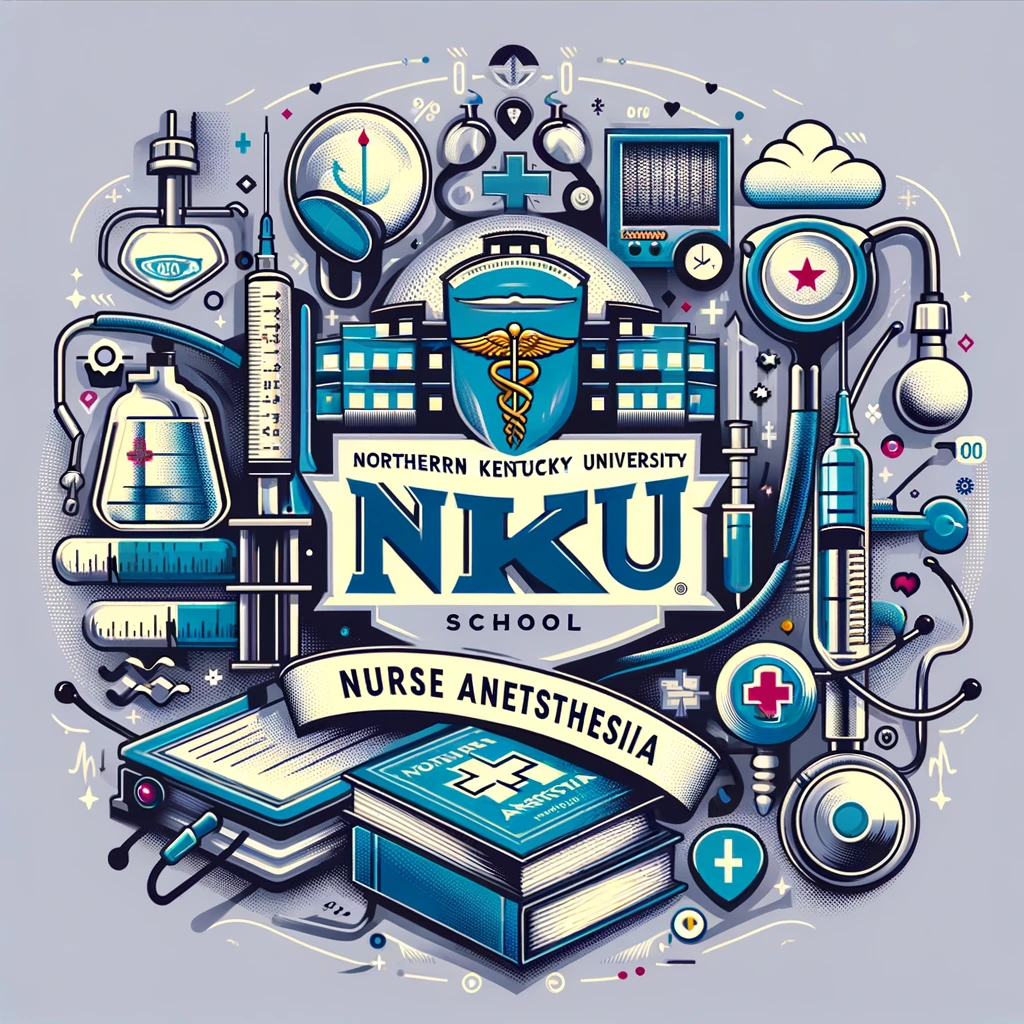Northern Kentucky CRNA Program
Consider a career where precision meets compassion: that’s the role of a Certified Registered Nurse Anesthetist (CRNA).
Northern Kentucky University’s CRNA program stands out as a premier choice, equipping nurses for a challenging yet deeply rewarding profession.
One of 4 Kentucky CRNA Schools , NKU enhances your nursing career with excellent education and hands-on experience.
If you’re looking to advance and enrich your professional journey, NKU’s CRNA program offers the perfect blend of comprehensive training and real-world application
Key Takeaways:
- Discover a clear outline of the admission requirements
- Explore the rigorous and expansive curriculum offered at NKU.
- Exceptional clinical experiences that distinguish NKU graduates.
- Understanding the community and quality of life for students in Northern Kentucky.
- Details on financing your education, including scholarship and aid opportunities.
- Learn if NKU fits your career aspirations and coals
Important Dates and Information:
| Program Length | 36 Months |
| Application Deadline | August 16th |
| Degree Offered | DNP |
| Class Size | 20 |
| Cost | In State: $79,076. Out of State: $101,124 |
| Contact | Program Administrator: Dr. Judy Tenhundfeld, DNAP, MSN, CRNA (859) 572-7966 email: tenhundfej1j1@nku.edu |
| Website | Northern Kentucky University CRNA School |
| School Location | Founders Hall 475/Health Innovation Center 40 Kenton Drive Highland Heights, KY 41099 |
Introduction to Northern Kentucky University CRNA
Starting a medical career takes work, skill, and lots of learning. Northern Kentucky University (NKU) shines brightly for those wanting to be Nurse Anesthetists.
It has one of the Best CRNA programs in Kentucky and helps makes students experts in the field of Anesthesia.
NKU’s Commitment to Nurse Anesthesia Education
NKU works hard to create top Nurse anesthetists. NKU CRNA School admission requirements helps the University to find the best students who will have the best chance of success.
With great teachers, modern places to learn, and working with top hospitals, NKU is among the Top Nurse Anesthesia schools. NKU’s curriculumn shows its dedication to making excellent CRNA’s.

Understanding the NKU Nurse Anesthesia Program Structure
The Northern Kentucky University Nurse Anesthesia Program offers a clear path for nurses to practicing Anesthesia.
This program is made for those who want climb to the pinnacle of the nursing profession and become Certified Registered Nurse Anesthetists (CRNAs).
Knowing the requirments and details about the program is important for students wanting to become CRNAs in Kentucky.
Program Length and Admission Requirements
The Nurse Anesthesia Program at Northern Kentucky University (NKU) offers a comprehensive BSN-DNP (Bachelor of Science in Nursing to Doctor of Nursing Practice).
This proram is designed for full-time study over 36 months, encompassing approximately 92 credit hours.
The program combines rigorous coursework with extensive hands-on clinical practice in various healthcare settings across Kentucky, ensuring students are well-prepared for their future roles in nurse anesthesia.
Northern Kentucky University CRNA Admission Criteria
To become a Highly Skilled CRNA you must understand the NKU’s admission requirements.
These requirements help find candidates ready for this tough field. Here are the main prerequisites for potential students.
Academic and Professional Prerequisites
If you want to be a nurse anesthetist at NKU you first need to meet some academic and professional criteria. Here’s what you need to get accepted
- Bachelor of Science in Nursing (BSN) from an accredited program
- Current and unrestricted Registered Nurse (RN) license
- A minimum undergraduate cumulative GPA of 3.0 or higher
- Completion of specific science coursework with a grade of ‘B’ or better
- Graduate Record Examination (GRE) scores, if required
- Three professional references attesting to the applicant’s academic ability and potential success in the CRNA role
The Critical Care Experience Requirement
Before you can be a CRNA, you need experience in critical care. NKU values this real-world experience. Here are the types of accepted critical care experiences:
| Sector | Type of Experience | Duration Required |
|---|---|---|
| Adult ICU | Direct care for critically ill patients; managing ventilators, invasive monitors, continuous infusions, etc. | Minimum of one year full-time |
| Pediatric ICU | Comprehensive care for critically ill children; similar to adult ICU requirements but within a pediatric setting | Minimum of one year full-time |
| Neonatal ICU | Specialized care for critically ill neonates and infants; proficiency in neonatal resuscitation and stabilization | Minimum of one year full-time |
| Cardiac ICU | Focus on cardiac care patients; managing postoperative cases, heart support devices, etc. | Minimum of one year full-time |
To get into NKU’s CRNA school, you need good grades and critical care experience. This process makes sure students are smart and skilled for one of Kentucky’s top CRNA schools.
Exploring the Curriculum of NKU’s Nurse Anesthetist Program
The NKU Nurse Anesthesia Program has a tough curriculum but fair program to prepare you for your Boards and career.
It prepares students for Nurse anesthesia’s changing world. Northern Kentucky University is proud of its program. The program mixes fun learning with deep theory. This makes the program very respected.
DNP Core and Anesthesia Specialty Courses
The program starts with important DNP core courses. They teach about health policy and more.
Then, there are anesthesia courses. These focus on the science of anesthesia and more. Students learn both in class and through hands-on practice. This builds their skills well.
Integration of Evidence-Based Practice and Clinical Experience
The CRNA classes in Kentucky, especially at NKU, mix research with practice.
Students learn how to use anesthetics. They also look at new studies to improve. They get to work in hospitals too.
This prepares them for real jobs. They use what they learn in class out in the world. This is key for Nurse Anesthetist programs.
Life in Northern Kentucky for CRNA Students
Located in Highland Heights Kentucky, NKU offers a great place to live and socialize as you prepare to become a CRNA.
Starting your studies at Northern Kentucky University is exciting. It’s not just about learning a lot. CRNA students find a helpful community here. This community helps students a lot. There are many places to learn real job skills. This is key for a nurse’s future.
Being a CRNA student means studying hard but also enjoying time with friends. Northern Kentucky has lots of fun things to do. NKU wants students to join local events. This includes meeting professionals and helping out in the community.
- Access to diverse healthcare settings for clinical rotations and employment
- Cultural festivals and events promoting work-life balance
- Outdoor activities like hiking in the beautiful Kentucky landscapes
- Networking opportunities with healthcare professionals and alumni
NKU cares about its students a lot. They want students to do well in school and life. The program helps students become strong and grow as people.
Northern Kentucky is a special place for CRNA students. It offers a warm welcome and city excitement. At NKU, students face tough studies and grow personally. They become skilled and caring nurses.

Costs, Financial Aid, and Scholarship Opportunities at NKU
Going to a top Nurse Anesthesia school like Northern Kentucky University might be pricey. But, NKU makes sure students can afford their best CRNA programs in Kentucky. To start, you must understand the NKU CRNA admission requirements. Then, figure out how to pay for your schooling.
NKU helps students pay for school with lots of scholarships, grants, and loans. These funds help make the Northern Kentucky University CRNA program cheaper. They welcome students from all walks of life.
- Students who did really well in school can get merit-based scholarships.
- If you really need financial help, there are need-based grants.
- For other costs, there are federal and private loans.
If you are looking into these programs, talk to NKU’s financial aid office. They can guide you to the best aid for your needs. This way, the cost of studying one of the best CRNA programs in Kentucky can be lighter.
Conclusion
The journey at Northern Kentucky University’s CRNA program has been eye-opening. It shows how good it is for future nurse anesthetists. NKU is a top choice for Nurse Anesthesia education. It blends classroom learning with lots of clinical practice. This helps graduates do great in nurse anesthesia.
NKU’s program makes top nurse anesthetists. It offers a strong BSN-DNP and Post-Master’s tracks. The program is known for making skilled pros. These pros are great at their jobs and caring for patients.
If you like great facilities, top teachers, and a friendly place, NKU is for you. Investing in NKU means you’re on your way to a great healthcare career. This article showed what NKU offers. It’s a place of new ideas, top quality, and commitment. It prepares future nurse anesthesia leaders.
If you are looking for other schools out side of Kentucky and want to know where to find those schools, you can find them at CRNA Schools by State.
FAQ
What is the Northern Kentucky University CRNA Program?
It is a respected program. It trains students to become Certified Registered Nurse Anesthetists.
What are the admission requirements for the NKU Nurse Anesthesia Program?
Applicants need to meet academic and professional needs. This includes specific courses and GPA. They also need critical care experience.
What are the different tracks offered by the NKU Nurse Anesthesia Program?
There are two tracks. The BSN-DNP track is for nurses with a bachelor’s degree. The Post-Master’s CRNA track is for nurses with a master’s degree.
How long is the NKU Nurse Anesthesia Program?
The time it takes depends on the track. The BSN-DNP track takes 3-4 years. The Post-Master’s CRNA track takes about 2 years.
What courses are included in the NKU Nurse Anesthesia Program curriculum?
The program includes DNP core and anesthesia specialty courses. They teach evidence-based practice and clinical skills.
What is life like for CRNA students at Northern Kentucky University?
Students find support and many opportunities for work and fun. The city provides a great place for learning and growing.
What are the costs of attending the Northern Kentucky University CRNA program?
Costs include tuition and fees. There are financial aid options like scholarships, grants, and loans.

